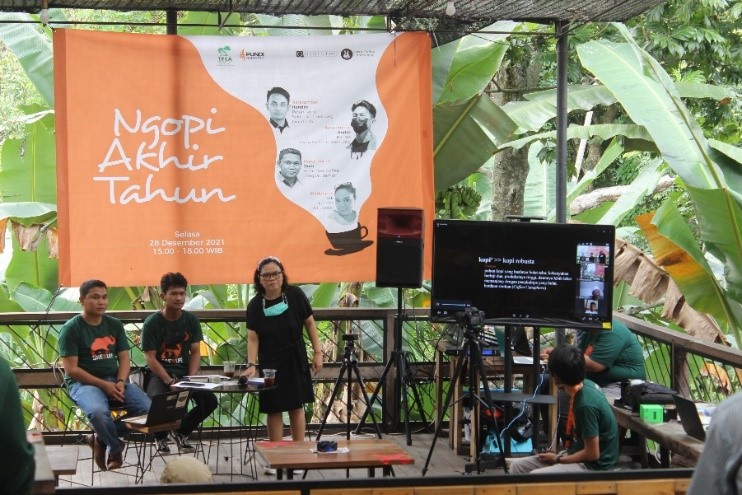
End of Year Coffee
Coffee is one of the commodities whose demand continues to increase in the market. Indonesian consumption of coffee is also increasing. To fulfil this demand, product availability must always be maintained. When it comes to enjoyment, there is no word that exactly describes the true taste of coffee, as each connoisseur has their own meaning and perspective. Coffee has also become a representation of the current and modern lifestyle for some people. This can be seen from the number of coffee shops that have mushroomed across the archipelago. Coffee shops are now a favourite place for many people from all walks of life and a place that is quite existent for millennials.
On 28 December 2021, Pundi Sumatra as the south-central regional office of TFCA-S initiated a semi-online sharing session with the theme ‘Ngopi Akhir Tahun’ at one of the coffee shops in Jambi. This discussion invites the general public, especially the younger generation of coffee lovers, to listen directly to the story of how the coffee was picked, then produced to become a product packaged under various brand names which are then marketed to various parts of Indonesia. This semi-online activity presented three speakers including Hendro, a Sekincau coffee farmer from Lampung, then Dodi, from Serampas Kopi of Merangin Regency and Andre, a barista from Swan Coffee Community Jambi.
Although we held the event in an open space, we still had a responsive discussion thanks to the support of the cool venue and natural surroundings. ‘Ngopi Akhir Tahun’ serves as a form of reflection for coffee activists and connoisseurs while listening to stories of the coffee journey from upstream to downstream. We heard many stories of the struggles of coffee farming communities living around the buffer zone of the National Park. They strive to protect the landscape on the island of Sumatra through conservation activities.
The first story came from Hendro, a coffee farmer from Sekincau Lampung, whose interest in coffee began when he left to migrate. In 2011, he began utilising his parents' garden by planting 2500 coffee seedlings. Aware of his limited agricultural knowledge, Hendro continued to improve his knowledge through various counselling until he really decided to become a coffee farmer. In managing the 1-hectare coffee plantation, the maintenance is quite simple, Hendro emphasises the provision of fertilisers that must be ensured so as not to be late in order to increase plant productivity. The post-harvest process he does is to process the coffee beans to the drying stage to form dry beans and then sell them to collectors in his area. In a year, the average yield obtained can reach between 6-8 quintals, but this condition is very dependent on the weather.
From Merangin Regency, Dodi said that it was not easy for the coffee farmers of Rantau Kermas Village to produce the best coffee beans known today. Challenges and obstacles in the upstream production process included a lack of knowledge and limited tools. The absence of a strong leader was also a major influence in uniting the minds of the Rantau Kermas coffee farming community. Dodi, who had already been active in community social activities, eventually joined the management of the Serampas Kopi production house formed by BUMDES. Over time, limitations began to be addressed together so that slowly, any obstacles could be overcome. This business was also assisted through various counselling and received various funding support.
At the beginning of 2021, robusta coffee farmers in the Rantau Kermas village received a geographical indication certificate related to the recognition of robusta coffee originating from Sumatra in Merangin Regency, Jambi Province. This acknowledgment is a form of appreciation for upstream coffee farmers in processing quality coffee beans. Serampas coffee is a brand that is quite well known in the community, even though it is still relatively young in the coffee scene in Jambi, but the climate for the Serampas coffee market has been sufficiently formed to penetrate the Kalimantan market. With the aroma of Robusta coming from the highlands of the Barisan Hills, Merangin Robusta Coffee offers a different taste from other coffees.
This story certainly continues with coffee activists in the downstream section, a barista named Andre who is also active in the Swan Coffee Community admits that coffee that comes from upstream is no longer processed in that way, because most business actors downstream already receive coffee that has been processed. roasted, so that the next process remains to maximize and slightly processed according to the direction of consumer tastes. In Jambi province itself, on average, there are two varieties of coffee that are quite popular in coffee shops, namely Arabica and Robusta coffee, however, Robusta coffee is quite in demand because it is the most dominant used as the basic ingredient in processed milk coffee which is currently in demand by the market.
This reason refers to the characteristics of robusta which is dominated by bitter and brownish taste, when mixed with palm sugar it is more suitable and liked by consumers. In conclusion, this semi-online discussion aims to facilitate meetings between upstream coffee farmers and downstream coffee activists to exchange ideas and share experiences in establishing economic chains in the coffee sector, as well as joint learning materials, especially between these business actors who are interrelated and need each other.
